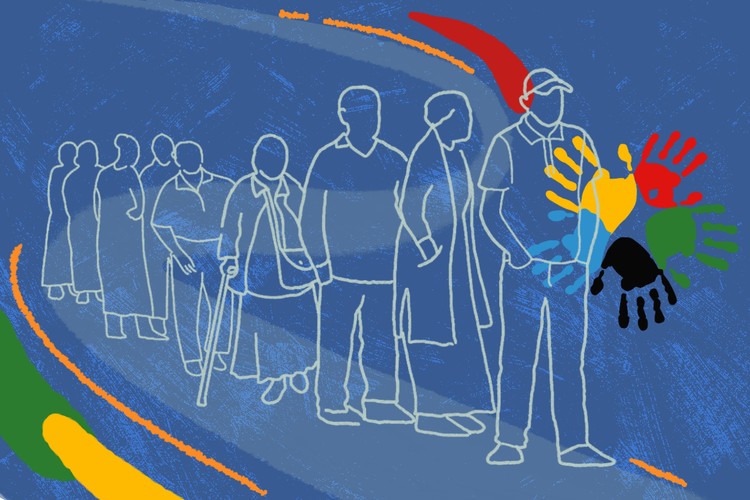
21 May 2025
The “pandemic-related” Social Relief of Distress grant will be discontinued next year according to the budget tabled in Parliament on Wednesday. Graphic: Lisa Nelson
In his budget speech on Wednesday, Finance Minister Enoch Godongwana said the R370-a-month Social Relief of Distress (SRD) grant will be extended to the end of March 2026.
What will happen after that is not clear.
“Government is actively exploring various options to better integrate this grant with employment opportunities,” Godongwana told Parliament. “This includes considering a job-seeker allowance and other measures, as part of the review of Active Labour Market Programmes.”
“Our goal is to not only provide immediate relief. It is also to create pathways to employment, empowering our citizens to build better futures for themselves and their families,” Godongwana said.
No money has been set aside in the social development budget for this grant beyond the 2025/26 financial year.
The Department of Social Development (DSD) has been allocated R285-billion for social grants in the 2025/26 year. This includes money for increases in grants announced in April. But the allocation will drop to R260-billion in 2026/27, “due to the discontinuation of social relief of distress for the Covid-19 pandemic and a downward adjustment to fund other government priorities”.
“An estimated 45% of the South African population relies on social grants or social relief of distress as a major source of income, including 13.2-million recipients of the child support grant and 4.3-million recipients of the old age grant,” the Treasury says.
“The termination of pandemic-related relief funding is expected to see a reduction in the total number of social assistance beneficiaries from an estimated 27.7-million in 2024/25 to 19.3-million in 2027/28.”
The Treasury says measures will be taken to make sure that “spending remains sustainable”.
“Specifically, conditions have been placed on transfers to SASSA’s operational budget to manage these cost reductions, for example, through improved biometric and income verification.”
Siyanda Baduza, a researcher at the Institute for Economic Justice, said it was not clear that the grant would be cancelled. “Its exclusion from the main budget has been a recurring pattern for years. Since its inception, the SRD grant has only ever been renewed for one year at a time, with Treasury often making it seem as though it would expire despite provisional allocations being made for the grant in the fiscal framework,” he said.
Of greater concern, he said, is that the value of the grant has not increased. He said at R370 a month the grant was equivalent to only R293 a month in 2020 prices, “making it worth less than when it was R350 in 2020”.
Baduza said only Cabinet and the Department of Social Development can decide to end the grant, and both have indicated it will continue and eventually transition into a basic income.
He criticised the plan to turn the SRD grant into a job-seeker grant. “Placing work-seeking conditions would be costly and ineffective.”
He said high unemployment is structural and “not because people aren’t trying hard enough to find work”.
“It would force people to look for jobs that simply do not exist,” he said,
SASSA spokesperson Paseka Letsatsi told GroundUp the agency has already begun implementing the new conditions set out by the Treasury. He said these conditions will be implemented in phases, “balancing them with resources in our local offices across the country”.
In a briefing to Parliament in April, SASSA said one of the conditions was that SASSA must now conduct monthly checks on applicants’ bank accounts, not just for the SRD grant but also for child support, old age, disability and care dependency grants.
In January, the Gauteng High Court in Pretoria ruled that some of these measures, which exclude many applicants, were unlawful and unconstitutional. The DSD and Treasury have since appealed the ruling.
The new conditions also require SASSA to do mandatory data cross-checking with Home Affairs, Correctional Services, and the Unemployment Insurance Fund, among others, for grant applicants.
Earlier this month, SASSA began biometric verification for grant beneficiaries using alternative forms of identification other than the standard 13-digit South African ID number. These checks will now be increased.
To implement income verification, SASSA is also expected to finalise data-sharing agreements with SARS and the National Student Financial Aid Scheme (NSFAS) to assess income of applicants for grants, including the child support, old age, disability, and care dependency grants.
SASSA will also be expected to report quarterly on progress implementing the new measures, including the number of grants reviewed, cancelled, and the savings per grant type.
Civil society groups have raised concerns that the new requirements could lead to mass exclusion. The Universal Basic Income Coalition (UBIC) has warned that these requirements risk creating “systemic exclusion” that could cut off millions of vulnerable people from accessing grants.
UBIC questioned Treasury’s authority to impose policy instructions on SASSA, saying: “This is undemocratic. It is not the prerogative of the National Treasury to dictate the way in which the Department of Social Development implements its own regulations.”